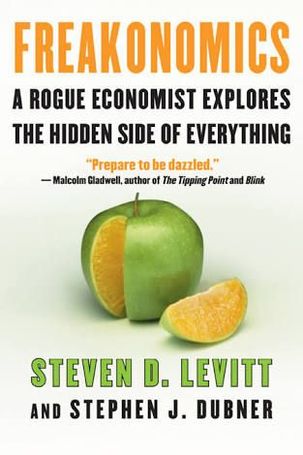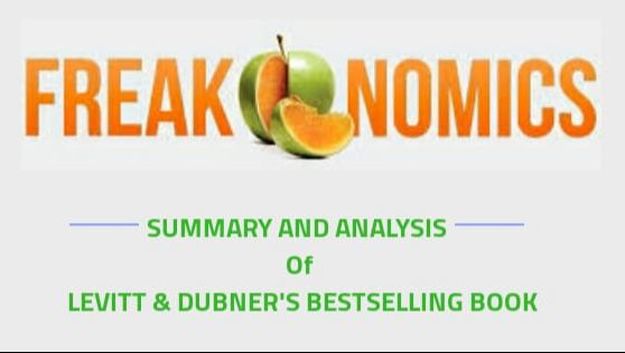ECONOMICS STUDY CENTER, UNIVERSITY OF DHAKA
|
Tasin Raian, MD. Newaz Shorif Wazed If you are even slightly bibliophile or interested in books you have probably heard about Stephen D. Levitt and Stephen J. Dubner’s 2005 NY TIMES bestseller “FREAKONOMICS”. Thirteen years have passed since it has been published and yet the book is still creating gossip, speculation and criticism.  sBACKGROUND Steven D. Levitt, an American economist and professor of Economics at University of Chicago was known for his exotic researches even before the publication of the book. The main focus of his research was incentive and how it motivates us to act economically. In 2005 he, with help of New York Times editor Stephen J. Dubner, published a concise version of his research under the name “FREAKONOMICS”. The book became an instant bestseller and managed to get a cult following. OVERVIEW The book doesn’t focus on one or two topics. Rather it’s a collection of “ECONOMIC” essays written by Levitt. In these essays he has applied economic theory in topics which are not covered by “traditional economics”. In this book Levitt and Dubner argue that Economics at its core is a study of incentives. They discuss about different scenarios in the chapters of the book. In chapter 1, writers discover that cheating is not only limited to professional criminals but also extend to teachers, sumo wrestlers and Washington DC area bagel business and its customers. In chapter 2, writers discuss about information control as a powerful tool for manipulation. In chapter 3, writers discuss the economics of drug dealing and working conditions of drug dealers. Chapter 4 shows how legalizing abortion played key role in reducing crime in USA and contrasted situation in Romania. Chapter 5 discusses the negligible effect of good parenting on education. The last chapter shows socioeconomic pattern of naming children. Both of the authors use data to interpret various situations throughout the chapters. They also put emphasis on behavior analysis rather than economic modelling. SUMMARY As the book consists of many random and unrelated experiments it’s hard to summarise the book into a couple of sentences. Rather different experiments have different sets of results and interpretations. One experiment deals with the topic of information advantage. The result of the experiment showed when real state agents sell their own home they wait a couple of months even when they were offered 90% of their asking price. But when their clients were offered the same amount, agents advise their client to take the deal immediately. The authors interpreted that even if real estate agent’s client get 100% of his/her asking price the increase in agent’s commission will be negligible. In the late 1980s the crime rate in the US dropped significantly. Many criminologist and sociologist speculated various reasons such as improved police strategy, strong economy etc but professor Levitt described that this incident was actually linked to a totally different phenomenon. In “Freakonomics” he said this incident actually happened because the legalization of abortion throughout US. He argued as parents neglected unwanted child, these children were more likely to become criminal in their adult life. The authors also found out that people with specific names end up being criminals and strip dancers. With the help of data related to these experiments authors argued big effects can be caused by distant and subtle reasons. Another experiment questions the conventional perspective of drug dealing. People often consider drug dealers to be rich. But the authors found that conventional “wisdom” of drug dealing is hardly true. After gathering financial data from real drug gang, authors found although the boss of a gang manages to earn a significant amount of money the other members of the gang particularly lower rank members earn as low as 3.33$ a day which is even lower than US average. Though different chapters of the book contains different scenarios and interpretations the underlying essence of all these effort is to demonstrate that tools of economics can be used to identify and interpret “unexpected patterns of the real world” which the “theoretical economists” often fail to interpret. INFLUENCE AND POPULARITY Immediately after release the book secured the 2nd spot in New York times non-fiction best seller list. Till now the book has been sold over four million copies. The book also became best adult non-fiction book in 2006 Book Sense award. The book is known for melting pot culture with economics. The books popularity is mostly referred to its easy language, real world experiments and pop culture references. Some economists argue that Economics as a research field is data dependent, the authors used their data nicely and managed to find unexpected patterns and the reasons. A 2011 survey named Levitt as the fourth most popular economist behind Krugman, Mankiw and Acemoglu. CRITICISM Despite getting into the best seller list and a cult following, the book couldn’t avoid criticism. Freakonomics has been criticised for being a book of sociology or criminology instead of economics. Economist Ariel Rubinstein criticized the book for using dubious statistics and said “connection to economics in this book is none”. But the book got most of its criticism for its “Legalized abortion and crime” essay. Though the book says the author’s research paper showed legalized abortions have lowered crime, many other researchers couldn’t replicate the results. In November 2005 Federal Reserve Bank of Boston economist Christopher Foote published a working paper in which he argued the results in Levitt’s paper were due to its statistical errors. CONCLUSION Economics as a field of social science has been based on theoretical models for many years. Thousands of books have been published about economical models and their credibility. Yet these models have often failed to interpret the real world. But in Freakonomics instead of giving any economic theory which “works” authors have found real world anomalies using tools of economics and interpreted them. Though the book has its shortcomings it successfully argues that the time has come for economists to move on to “a behavioural approach” from “theoretical approach”. Writer Research Assistant
0 Comments
Leave a Reply. |
Send your articles to: |



